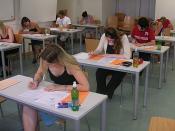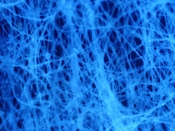English 110.03 Nick Cappy Final Exam: Self-Evaluation Essay April 35, 2004
Peer Response and the Writing Process
There is no such thing as an entirely unique writing style. All writing is a selective assimilation of styles and techniques experienced through reading. We develop a sense of "good writing" through a process of natural selection that occurs on a subconscious level every time we read something. When we read something that works, our mind stores it as an example of "good writing"; when we read something awkward or that we don't like, our mind stores it as an example of something to avoid. The more we read, the more opportunities we get to go through this process of amassing knowledge. By consciously scrutinizing writing as we read, we can further accelerate and deepen the learning process. Great writers must also be great readers. I have come to understand this over past semester in English 110.
I have personally found peer response sessions to be the most helpful activity of this course; these sessions have improved my writing through both my peers' responses to my papers and my analysis of theirs.
The primary purpose of peer response is to give and receive feedback, which has obvious benefits for the student on the receiving end. In a peer response session, students exchange papers and respond to the other person's writing. Sometimes they address specific questions posed by the writer; sometimes they comment on the paper in general. The most common misconception about peer response is that it is a peer evaluator's role to proofread. This is not true. It is nice if they are willing to do so, but an effective peer response session focuses on issues such as structure, content, thesis, topic sentences, transitions and, if necessary, grammar. Many people...


